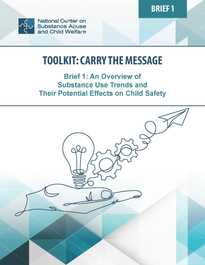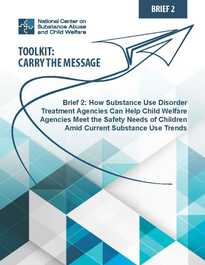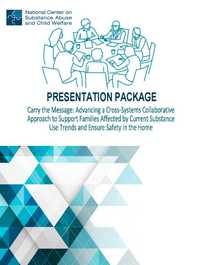Toolkit: Carry the Message How Substance Use Disorder Treatment Agencies Can Help Child Welfare Agencies Meet the Safety Needs of Children
The National Center on Substance Abuse and Child Welfare (NCSACW) prepared this toolkit to build capacity in the substance use disorder (SUD) treatment and child welfare services workforce to respond efficiently to the safety needs of children when there is substance use in their home. Current substance use trends pose challenges for child welfare systems as they strive to ensure child safety. Examples of these trends include the increased availability and potency of cannabis, more states considering legalizing medicinal and personal cannabis use, increased prevalence of fentanyl in other substances, large numbers of overdose deaths, and the re-emergence or ongoing use of stimulants, particularly methamphetamine.
The goal of the toolkit is to strengthen collaboration and provide training to child welfare staff to better understand the safety needs of children and their parents. The toolkit includes two briefs and a presentation package for SUD treatment and recovery professionals to strengthen their capacity to provide outreach and training to child welfare agencies.
Brief 1: An Overview of Substance Use Trends and Their Potential Effects on Child Safety

National Center on Substance Abuse and Child Welfare, 2025
Provides an overview of current and emerging substance use trends and their effects...(Read More)Brief 2: How Substance Use Disorder Treatment and Recovery Agencies Can Partner with Child Welfare Systems to Deliver Training t...

National Center on Substance Abuse and Child Welfare, 2025
Considers three main questions for substance use disorder treatment and recovery...(Read More)Presentation Package: Advancing a Cross-Systems Collaborative Approach to Support Families Affected by Current Substance Use Tre...

National Center on Substance Abuse and Child Welfare, 2025
Developed as a resource to enhance collaboration and cross-training partnerships, the...(Read More)